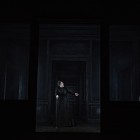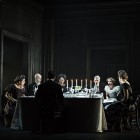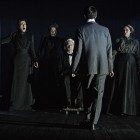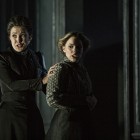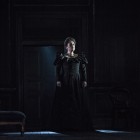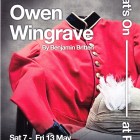Owen Wingrave 2016Royal Conservatoire of Scotland
Read more about the opera Owen Wingrave
The belated Scottish premiere of Britten's penultimate opera took place at the 2014 Edinburgh Festival. That staging, from Aldeburgh, gave an excellent idea of the piece, with four established stars performing with a group of recent graduates in a simple and effective staging. The Conservatoire has a good track record with Britten works, previously succeeding with Lucretia, Albert Herring and The Dream, and this production gave an undeservedly neglected opera its first showing in Glasgow.
One of the challenges is that distinction between the generations - while Owen, Kate and Lechmere are young adults, student age, the other characters, perhaps excluding Mrs Coyle, are a good bit older - middle-aged, and in the case of the General, quite elderly. This was an interesting test for a student cast, and the challenges were met head-on and with success.
As with the Edinburgh Festival production, the orchestral reduction by David Matthews was used. The original would certainly have been overpowering in the intimate auditorium. The band was well controlled by Tim Dean. The worry that developed concerned the difference between the third and fourth performances. The voices were all well-balanced, and with very few exceptions the words were projected with great clarity - young singers should certainly not need the help of surtitles when singing in English, and none were provided. However it was noticeable that while the third performance contained near faultless singing, at the final evening, most of the cast, at some stage, showed signs of vocal fatigue. Perhaps singing four nights out of seven was asking too much of these young voices - the creators chosen by Britten, after all, were fully mature artists with plenty of resources at their command. It is hardly surprising if the most vocally consistent singing came from the pair who had only appeared once before - Kenneth Reid (Lechmere) and Anne-Marie Loveday-Hill (Mrs Julian). Further comments below refer to the third evening.
The production was simple, allowing rapid scene changes. The three sides of Cordelia Chisholm's set had substantial doorways to emphasise the size of the house - useful exits for the cast to leave the dining room after the General's irrational outburst. They also provided enough of a suggestion of the picture-frames required. A fourth wall was lowered from the flies occasionally at the front, again with frames emphasised - particularly as Owen is locked into the haunted chamber. For the most part the lighting was subtle, atmospheric and, inevitably, sombre. Costumes were properly late Victorian.
Oliver Platt's direction made everything straightforward - the characters were properly differentiated and the actions clearly outlined, so the effect was cumulatively quite moving. Several times Owen was singled out with his back to the audience as he was assailed from all sides by his relations. Certain things stood out - Owen's father is among the portraits, and he was killed at Kandahar. Did the brothers Julian - Miss Wingrave's lover and Kate's father - also die there or elsewhere? The characterizations of the ladies made them quite distinct - the highly sympathetic Mrs Coyle (Annabella Ellis), of course, but the others were also treated with greater subtlety as the plot developed - Miss Wingrave (Maria Hughes) doomed to a spinsterhood of nursing her increasingly irascible father, the hysterical and self-pitying Mrs Julian (Charlie Drummond) out of control to the point where even her consistently repellent daughter (Lynn Bellamy) finds her an embarrassment. These four roles were all beautifully performed.
Owen is the central character, and Christopher Nairne's mature interpretation rightly dominated the evening, every word telling. He moves well on stage and completed a satisfying three-dimensional characterisation. Stefan Berkieta was a highly impressive Coyle, as he began to recognize that his life's work was something of a sham. His final benediction to Owen, with its hints of the War Requiem, was hugely moving. The two tenors were also excellent, with Lechmere (Richard Shaffrey) less shallow than usual. Having one tenor (David Horton) as the old General and the Narrator - a younger military figure - worked well.
Altogether this was an excellent interpretation of a difficult work that should now become a more accepted part of the regular Britten repertoire. Even though it is unbalanced it is a better piece than its reputation suggests. Certainly this staging is good enough to be taken up by one of the professional companies.
Performance Cast
- Owen Wingrave the last of the Wingraves
- Spencer Coyle head of a military cramming establishment
- Lechmere a young student of Coyle's
-
Richard Shaffrey (May 7, 11)
Kenneth Reid (May 9, 13)
- Miss Jane Wingrave Owen's aunt
- Mrs Coyle
- Mrs Julian a widow and dependant at Paramore
-
Charlie Drummond (May 7, 11)
Annie Loveday-Hill (May 9, 13)
- Kate Mrs Julian's daughter
- General Sir Philip Wingrave Owen's grandfather
- Narrator a Ballad Singer
- Boy
-
Oliver Patterson (May 7, 11)
Robbie Baxter (May 9, 13)

